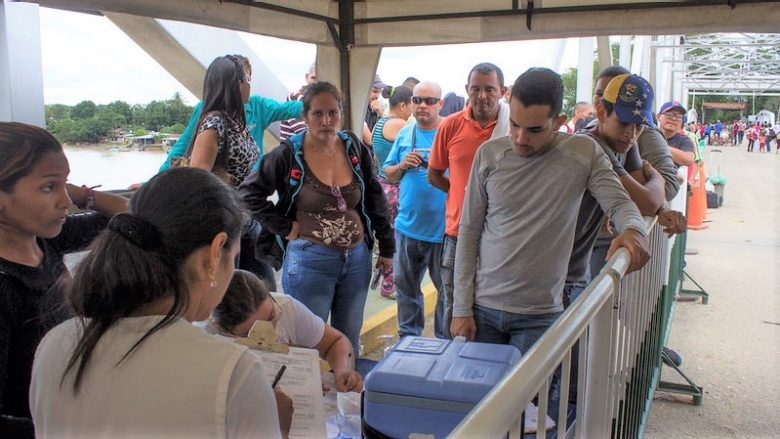Challenge
In 2015, Colombia faced sudden fiscal and migration-related challenges alongside longstanding economic challenges related to weak productivity and high inequality. Despite achieving one of the highest GDP growth rates in Latin America between 2005 and 2014, robust growth was not accompanied by productivity gains. Productivity was hindered by market failures, burdensome regulation, lack of economic diversification and insufficient incentives for firms to innovate and diversify away from extractives, underscoring the need for structural reforms. Colombia also faced fiscal challenges, including a plunge in the global price of oil, a key source of government revenue, and spending pressures related to the implementation of a 2016 peace agreement with the country’s largest insurgent group. A surge of migration from Venezuela that started in 2015 amplified existing fiscal and economic integration challenges.
Approach
A series of two DPFs provided financing to support the implementation of policies to: a) improve fiscal sustainability and contingent liabilities management, b) foster productivity and growth in non-extractive sectors, and c) improve the economic and social integration of migrants. The fiscal aspects of the series built upon previous DPFs to Colombia, which had supported adoption of the fiscal rule, tax policy reforms, reform of royalties, social security liability management, improvement of firms’ access to finance, and innovation and trade facilitation reforms. The second DPF adapted these objectives, adding a pillar on migration in a short time frame. The support innovatively combined a traditional World Bank loan with concessional financing from the Global Concessional Financing Facility (GCFF), and a trust fund providing support to countries experiencing migration shocks. (Colombia was the first country outside the Middle East and North Africa to access the GCFF). The second DPF in the series was the first World Bank lending operation to support Colombia’s migration policy response.
Results
· Prioritization of public funding for science, technology, and innovation (STI), reform of tax incentives for innovation, and improvements in the transparency of STI-related public expenditures improved the capacity of firms—especially small- to medium-sized firms—to innovate.
· Adoption of new environmental taxes, measures to control contraband and money laundering, provision of incentives for electronic invoicing, and clarification of reporting requirements under a new transfer price regime contributed to an increase in non-oil revenue and an increase in the number of taxpayers.
· Moreover, Colombia introduced measures to regularize the legal status of migrants from Venezuela and to facilitate their access to the labor market and basic services such as education and health.
Colombia worked with the World Bank to improve fiscal sustainability, implement productivity-enhancing measures, and integrate migrants into the economy. Key results in 2015 -2019 include:
• The launch in several cities of one-stop business registration, operation, and closure systems. More than 42,000 firms registered through an online platform between 2015 and 2019.
• Cuts in recurrent expenditures reduced central general operating expenses as a share of GDP from 3.1 percent in 2015 to 2.8 percent in 2019. Non-oil central government revenue rose from 12.5 percent of GDP in 2015 to 13.4 percent in 2019.
• Some 748,476 new taxpayers were added during 2016‐18.
• The share of fiscal incentives for STI projects granted to firms in sectors other than mining and energy rose from one-sixth in in 2015 to two-thirds in 2019.
• Between 2015 and 2019, more than 281,000 migrants were issued a PEP (Permiso Especial de Permanencia), of whom more than 139,000 were women. Nearly 77,000 migrants received support from the National Employment Agency to find formal jobs.
Bank Group Contribution
The World Bank Group, through the International Bank for Reconstruction and Development (IBRD), provided loans totaling $1.42 billion to finance the two DPFs. An additional $31.5 million was provided at concessional terms through a trust fund financed by the GCFF. The project was complemented by an International Finance Corporation (IFC) advisory project to support business registration simplification efforts.
Partners
The programs were implemented by Colombia’s Ministry of Finance (Ministerio de Hacienda y Crédito Público) and National Department of Planning (Departmento Nacional de Planeación). The World Bank collaborated with the International Monetary Fund (IMF) to assess macroeconomic developments, including fiscal projections and debt sustainability analysis.
Looking Ahead
The three main areas covered in the development objectives of the series have all been continued in subsequent World Bank engagements. The latest Public Finance Review for Colombia helped formulate fiscal policies to help reduce inequality, protect the most vulnerable, and support the post-COVID-19 economic recovery. Support for productivity-related reforms has been extended in the Competitiveness and Recovery DPF (P175801), approved in September 2021. Support for Colombia’s migration policy framework is being provided in the Social and Economic Integration of Migrants DPF (P176505), the first Bank lending operation focusing exclusively on policies that facilitate the social and economic integration of a migrant population, approved in November 2021, as well as ongoing technical assistance.
Learn More
Second Fiscal Sustainability, Competitiveness, and Migration DPF - (P162858)
Colombia Fiscal and Growth DPL 1
World Bank Supports Improved Public Spending and Productivity in Colombia
